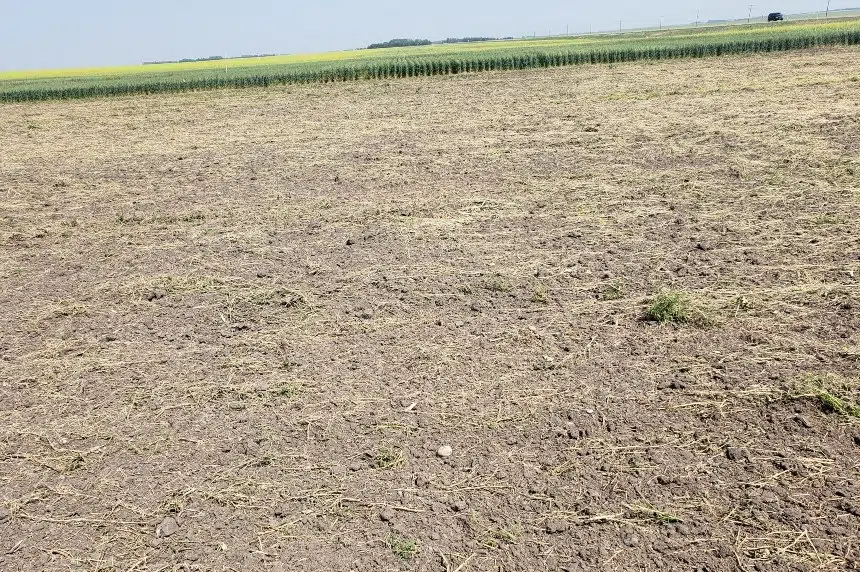Walking across the field at Rolo Farms, just north of Regina, the ground crunches and cracks.
Justin Ritco is the agronomy manager there. 980 CJME paid him a visit to see what it’s like to deal with the dry, extremely hot conditions we’ve seen this summer.
He explained that their crops, mostly canola, wheat, durham, peas and lentils, will make it through the season. However, they’re much shorter and thinner than usual.
“We have no topsoil moisture here anymore … There is no moisture left in the top 20 cm of this soil, currently,” Ritco said. “To summarize, we’re in a drought. That’s what it comes down to.”
He went on to explain that they have a saving grace thanks to the type of soil they plant on.
“We’re very fortunate in this area to have heavier soils that are able to retain a lot more moisture, so the crop’s holding on … But it’s a lot thinner than it should be,” he said.
“We’re in actually pretty good shape in comparison to other parts of the province.”
He’s right that a lack of moisture is an incredibly common problem in Saskatchewan right now. In the last crop report, the Ministry of Agriculture said that only 14 per cent of crop land has enough topsoil moisture. It’s even worse for hay and pasture land, where it’s only adequate for nine per cent.
Ritco pointed to deep cracks in the earth as a clear indicator that it’s just too dry.
“The clays we have here around Regina, they’ve very heavy. They shrink and swell. You can see some cracks around this area. They’re probably 10 feet plus deep. If you lose something in there, you’ll never get it back. So, it’s just a testament to how dry it is, seeing some of these cracks where the earth has opened up and there’s no moisture for quite a depth,” he explained.
On top of the drought conditions, the heat brings with it another menace: pests.
“We’ve been fighting grasshoppers non-stop. There (have) been a couple of waves of them this year so far,” Ritco said.
Not only can they damage crops, it’s a major pain to keep them away.
“We do our best to limit our insecticide use, especially in the area because we are close to the city. That’s putting an extra amount of pressure on me, because I have to scout the fields continuously and make sure that when we are using an insecticide, that it’s needed … We don’t want to be spraying for no reason because (for) one, the chemical is quite expensive, and it also can be harmful to other insects,” he said.
Everything put together makes this a tough growing season, where Ritco believes they’ll have significantly lower than average crop yields.
“I’m sure it’s one I’ll remember for the rest of my life. Yeah, this kind of drought …. Hopefully it’s the last time I see it.”







